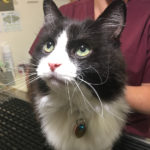Have you noticed that your pet has smelly breath? This month is “Pet Dental Month” with the aim to highlight one of the most common medical complaints in both dogs and cats. All pets should receive a thorough dental exam with their annual health check up and vaccination. Just like us, pets can suffer from a build up of plaque and tartar on their teeth. This causes bad breath and red inflamed gums, known as gingivitis. Diet, genetics and poor teeth alignment in some breeds are important risk factors for dental disease. A dry food diet, regular raw meaty bones and dental chew products are ideal for good oral health. At the early signs of dental disease your vet will recommend that your pets teeth are scaled clean and polished under a general anaesthetic.
Pet Dental Health with Dr Kristi Green of Hoppers Crossing Veterinary Clinic and HospitalIn advanced dental disease, loose teeth may need to be removed and antibiotics given to treat infection. This is common in the many elderly patients we treat with dental problems. So what else can be done to prevent dental disease? Regular tooth brushing with pet toothpaste is very effective, or for those with less time see your vet clinic for a range of dental diets, mouth gels and chew products. It will be so much nicer getting up close with your pet without the smelly breath! This is our vet nurses pet Bentley the Yorkshire terrier born with a dental disease known as enamel hypoplasia.



